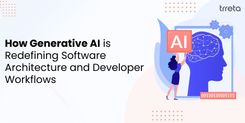Artificial intelligence (AI) is having a profound impact on many different industries and is transforming the way businesses and organizations operate and serve their customers. With the help of AI, organizations are able to automate complex processes, make better predictions and decisions, and provide more personalized and efficient services to their customers.
One of the key areas where AI is making a big difference is in the field of healthcare. AI algorithms are being used to analyze medical data, such as images, records, and biomarkers, and to make more accurate predictions about the likelihood of diseases and the effectiveness of treatments. This can help healthcare providers to diagnose and treat patients more effectively, and improve the overall quality of care.
Another area where AI is having a significant impact is in the field of retail. Retailers are using AI-powered systems to personalize their products and services and to provide more tailored and relevant recommendations to customers. These systems can analyze customer data, such as their browsing and purchase history, and use machine learning algorithms to make predictions about their preferences and interests.
AI is expected to have a major impact on a wide range of industries in the coming years. On one hand, by automating routine tasks, improving decision-making, and enabling new and more efficient ways of working, AI is expected to help businesses and organizations in many different industries to become more productive, efficient, and competitive but on the other hand, it will result in a lot of jobs being replaced.
It is difficult to predict exactly which jobs will be replaced by AI in the coming years, as it will depend on a number of factors, including the rate of technological progress and the willingness of businesses and organizations to adopt AI-powered systems.
Some jobs across various industries are likely to be automated or replaced in the coming years due to the growing impact of AI technology.
- Data entry and other routine administrative tasks: AI-powered systems are capable of processing large amounts of data quickly and accurately. As a result, many jobs that involve routine data entry or other administrative tasks are likely to be automated in the coming years.
- Customer service and support: AI-powered systems are able to understand natural language and provide answers to customer inquiries. As a result, many jobs that involve providing customer service or support are likely to be replaced by AI in the coming years.
- Manufacturing and assembly line work: AI-powered systems are able to perform many tasks that are currently done by humans on manufacturing and assembly lines. As a result, many jobs in these areas are likely to be automated in the coming years.
- Driving and transportation: AI-powered systems are being developed for use in self-driving vehicles. As a result, many jobs that involve driving or transportation, such as truck driving and taxi driving, are likely to be replaced by AI in the coming years.
Overall, it is likely that AI will automate or replace many jobs that involve routine tasks or require relatively little creativity or decision-making. However, it is also likely that AI will create new job opportunities in areas such as AI development and deployment, data analysis, and AI-powered product and service development.
The impact of artificial intelligence on various industries:
AI has brought remarkable changes to industries worldwide, transforming the way we work and interact. While some industries are set to experience significant job growth driven by AI innovations, others might face shifts where certain roles decline but new opportunities come up.
Let’s explore how AI has impacted the world and the industries most influenced by this revolutionary technology.
-
Voice-Based Search
The development of artificial intelligence (AI) has had a profound impact on nearly every area of human existence. One AI technology that benefits from AI's ability to streamline processes for its users is speech recognition. The latest innovation can transcribe your voicemails into text for you. It can also teach your speech to issue commands with your voice. As a result, Apple, Microsoft, Amazon, Google, Facebook, etc., have given this AI-powered speech recognition technology a lot of attention. Devices and software with built-in voice recognition are already commonplace; examples include Amazon's Echo, Apple's Siri, and Google's Home.
-
AI In Healthcare
The use of AI in healthcare has only recently begun. Machine learning (ML) offers promise in identifying trends within a population, similar to how computer vision (CV) can diagnose diseases using X-rays and NLP (natural language processing) can in medication safety. All of these advancements for patients will come together once we achieve real information interoperability, which supports the safe interchange of health data.
-
The Impact of AI on Jobs
Artificial intelligence (AI) will have future repercussions for your company. There is the possibility of a significant effect on how your business functions, yet there is no apparent downside. It calls for an optimistic outlook and an eagerness to try something new.
Many sectors of the economy are experiencing profound shifts due to the advent of AI. When applied to commercial processes, AI's ability to recognise patterns and spot anomalies in massive volumes of digital information ushers new avenues of opportunity. It can perform a wide variety of everyday activities competently if trained.
Employees are freed from mundane, repetitive work so they may focus on higher-level technical difficulties or enhance the quality of customer care made possible by the advent of AI.
-
Business Intelligence
Data produced by customers, tools, and procedures is overwhelming for businesses. People find that the standard business intelligence tools they've been using still need to cut it. Artificial intelligence-driven solutions will soon replace traditional methods like spreadsheets and dashboards. These instruments can automatically probe the data, learn insights, and make recommendations. These resources will transform how businesses leverage information and make decisions.
-
Education
An area where AI is expected to have a significant impact on education. AI will significantly assist the education sector and system, which needs a considerable overhaul. All that must be done is pinpoint what needs to change and lay out a plan for implementing that change. One factor that could prove to be a game-changer in this regard is the use of AI easy writer in creating a unique, practical, and practically applicable learning path for any subject or topic.
-
Retail
Artificial intelligence will have profound effects on the retail sector. Retailers will invest heavily in artificial intelligence (AI) to provide superior customer service in the following years. Marketers in the retail industry are anticipated to start using AR/VR capabilities. The popularity of interactive, aesthetically pleasing product catalogs, where the final consumer can try out an item before buying it, is predicted to skyrocket.
Looking Ahead: How Companies Are Leading the Way in AI Adoption.
Here are a few examples of how specific companies in various industries are leveraging AI in their businesses:
-
AI Investments by Tech Giants:
A McKinsey study reported that in 2016, companies like Baidu and Google invested between $26 billion and $39 billion in AI, with 90% allocated to R&D and deployment, and 10% to AI acquisitions.
-
Netflix's AI-Powered Recommendations:
Netflix utilizes AI algorithms to personalize content recommendations for its subscribers, with over 80% of content viewed on the platform discovered through these personalized suggestions.
-
Bloomberg's AI Integration in Terminals:
Bloomberg employs AI and machine learning techniques, including natural language processing, to enhance the information available through their terminals, allowing users to interact with the system through conversational queries.
-
Uber's Machine Learning Infrastructure:
Uber's Advanced Technologies Group (ATG) has developed a machine learning model life cycle to manage multiple models, enabling quick iterations and continuous delivery for self-driving vehicle development.
-
Royal Bank of Scotland's AI Chatbot:
The Royal Bank of Scotland introduced 'Luvo', a cognitive chatbot powered by IBM Watson, designed to answer customer questions and perform simple banking tasks, aiming to enhance digital customer support.
In light of everything discussed…
The world of AI is evolving at a breathtaking pace, transforming industries and unlocking new levels of efficiency for businesses everywhere. From streamlining operations to opening doors to innovative solutions, artificial intelligence (AI) and machine learning (ML) are no longer just tools—they're game-changers.
Whether you’re looking to harness the power of AI for your business or explore the exciting career opportunities in this field, the possibilities are endless. With industries increasingly adopting these technologies, AI and ML stand out as some of the most exciting and promising areas to dive into.
At Trreta Technolab, we’re here to help you navigate this transformative wave. Whether it’s integrating AI into your business processes or exploring cutting-edge ML solutions tailored to your needs, our expertise ensures you stay ahead in this dynamic landscape. Let’s unlock the potential of AI and ML together!
FAQs
1). How will AI help your business to grow?
AI can improve efficiency, reduce costs, and provide insights from data to help you make better decisions.
2). Will AI replace jobs in your industry?
AI may automate repetitive tasks, but it often creates new opportunities and roles focused on creativity and problem-solving.
3). What industries benefit the most from AI?
AI is transforming healthcare, finance, retail, manufacturing, and customer service with automation and data-driven strategies.
4). Is AI implementation expensive?
AI solutions range from affordable tools to large-scale systems; costs depend on your business size and needs.
5). How can AI improve customer experience?
AI-powered chatbots, personalization, and predictive analytics help provide faster, more tailored services for customers.




